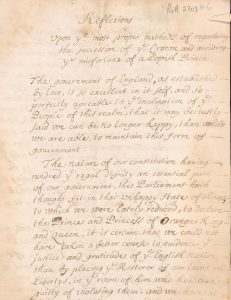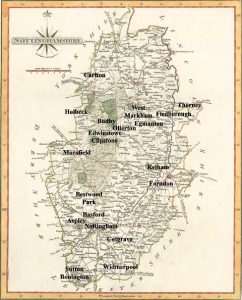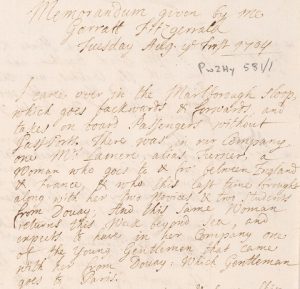November 5, 2021, by Kathryn Summerwill
Beyond the Mayflower: Catholics and recusants
Our new exhibition ‘Beyond the Mayflower’ is now open at the Weston Gallery, Lakeside Arts. A previous blog focused on the persecution of Protestant dissenters who wished to reform the Church of England. The church authorities were, however, even more suspicious of Roman Catholics. In 1593 practising Catholicism was made illegal. As plots in favour of the Catholic Mary Queen of Scots had demonstrated in the reign of Queen Elizabeth I (1533-1603), adherence to the Catholic faith could be associated with treason. This fear continued to influence government policy following the Gunpowder Plot of 1605, and during the Jacobite conspiracies of the 18th century. Throughout this period, Catholics were usually referred to in legal records by the perjorative terms ‘recusants’, ‘Popish recusants’ or ‘Papists’.
Persecution
On the walls of the Weston Gallery are quotations from some of the exhibits, including an extract from a letter written by the Archbishop of York, Tobias Matthew, in 1604 (Clifton Collection, Cl LP 14):
…The Puritans (whose phantasticall zeale I mislike) though they differ in Ceremonies & accidentes, yet they agree wth us in substance of religion, & I thinke all or the moste parte of them love his Majestie, & the presente state, & I hope will yeild to conformitie. But the Papistes are opposite & contrarie in very many substantiall pointes of religion, & cannot but wishe the Popes authoritie & popish religion to be established.
The idea that Catholics would owe their ultimate allegiance to the Pope rather than to the British monarch lay behind the punitive measures taken against them for more than two centuries. Justices of the Peace were empowered to fine Catholics who did not attend their local parish church £20 per month, and recusants could be jailed or have their property seized. People wishing to hold public office, or even local positions such as teachers, were required to take oaths of allegiance and supremacy acknowledging the monarch as the supreme head of the Church of England. Catholics unwilling to take these oaths were effectively banned from participating fully in civic society.
Catholics were also regularly presented by parish churchwardens to the Archdeaconry of Nottingham’s court. Presentment bills reporting religious offences survive for the period 1587 to 1643 (with some gaps), and again from 1663 to 1686. Each presentment bill has been catalogued and indexed using a consistent terminology. Anyone who was presented with explanatory words such as ‘Catholic’, ‘popish’, ‘papist’ or ‘recusant’ has been indexed using the offence term ‘recusancy’. There were nearly 3,000 presentments of this offence, and many thousands of others for ‘not attending church’, ‘not receiving communion’, or ‘standing excommunicate’. A detailed article on the various Catholics groups in Nottinghamshire as seen from the presentment bills has recently been published on the Archdeaconry Resources section of our website.
Migration
The ‘Beyond the Mayflower’ exhibition includes one case of material relating to migration. Items in the case reveal stories of colonialism, genocide, racism, and opportunity over the centuries.
The earliest item dates from 1704 and is a remarkable letter which provides information about a woman who assisted people in illegally crossing the channel between England and France in boats. It is clear from the correspondence that the people crossing were not economic migrants or refugees, but Roman Catholics. Young Catholic men were travelling to France to attend seminaries, and Catholic priests were crossing in the other direction to take up positions as private chaplains or tutors to wealthy Catholic families. Passports would not have been issued to allow this kind of travel, so it had to be done in secret.
Tolerance

Reflexions upon the most proper methods of regulating the succession of the Crown, and avoiding the misfortune of a Popish Prince, n.d. [1689] . Portland (Welbeck) Collection, Pw A 2303
It was not until 1829 that Catholics were finally able to worship in peace, and participate and contribute to society, following the passing of the Catholic Relief Act. Items from the collections held at the University of Nottingham feature in the ‘Catholic Emancipation‘ section of our online Learning Resource ‘Politics of the 4th Duke of Newcastle‘, developed in collaboration with Dr Richard Gaunt of the School of History.
However, in one respect, the British state still holds on to an important restriction to the practise of Catholicism. The central case of the ‘Beyond the Mayflower’ was sadly already too full of interesting exhibits to allow space for this document: Reflexions upon the most proper methods of regulating the succession of the Crown, and avoiding the misfortune of a Popish Prince’ . It dates from around 1689, when William, Prince of Orange, and his wife Mary were invited to take the throne in the ‘Glorious Revolution’ which overthrew the Catholic King James II. At this time, the line of succession after the joint monarchy was settled on Mary’s sister Anne. This pamphlet argued that, should Mary and Anne both remain childless, the throne should pass to the Protestant children of the Duchess of Hanover. This duly happened with the accession of King George I in 1714. George’s direct descendant is the present Queen Elizabeth II, and Roman Catholics are still excluded from the line of the succession to the British monarchy today.
To accompany the exhibition, there are a series of talks and behind-the-scenes gallery tours. Tickets can be booked through Lakeside Arts Box Office. To see the original archives and rare books, please contact Manuscripts and Special Collections on mss.library@nottingham.ac.uk to make an appointment to visit the Reading Room.
No comments yet, fill out a comment to be the first




Leave a Reply